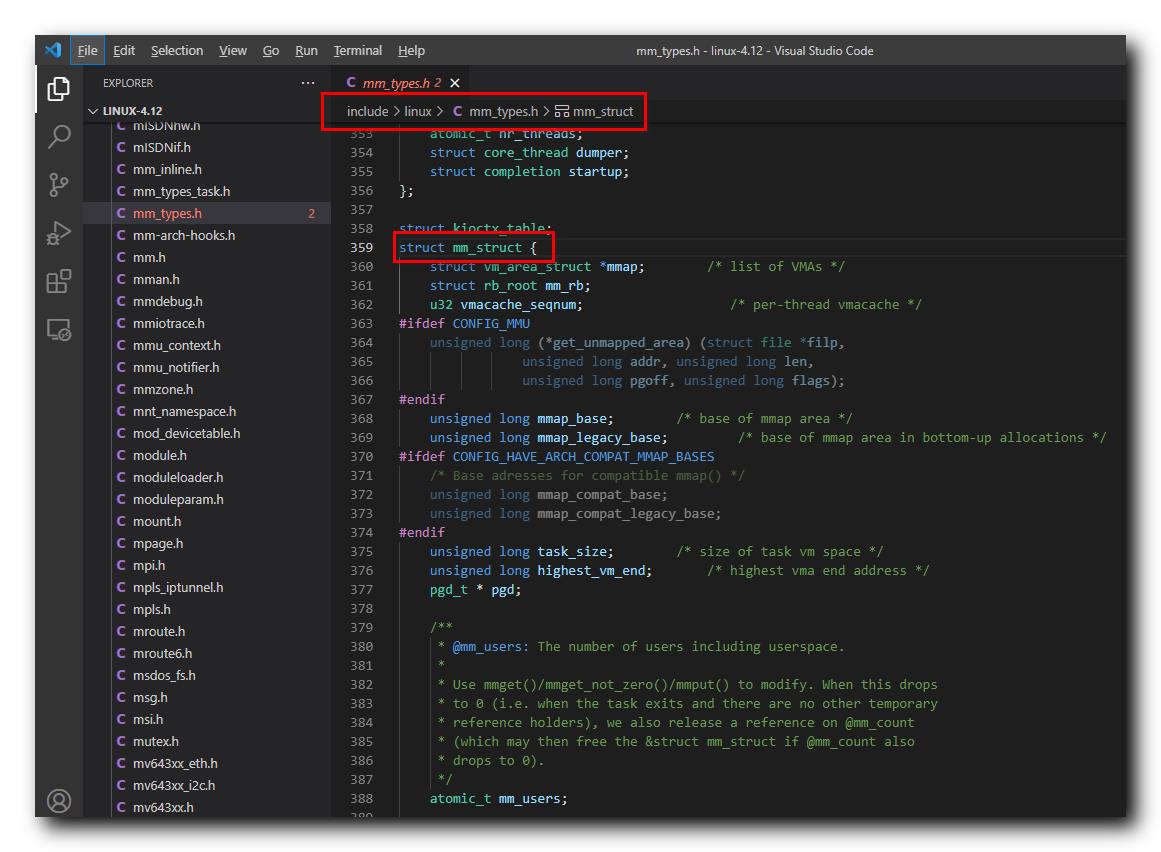Linux 内核 内存管理虚拟地址空间布局架构 ② ( 用户虚拟地址空间组成 | 内存描述符 mm_struct 结构体源码 )
Posted 韩曙亮
tags:
篇首语:本文由小常识网(cha138.com)小编为大家整理,主要介绍了Linux 内核 内存管理虚拟地址空间布局架构 ② ( 用户虚拟地址空间组成 | 内存描述符 mm_struct 结构体源码 )相关的知识,希望对你有一定的参考价值。
文章目录
一、用户虚拟地址空间组成
" 用户虚拟地址空间 " 包括以下区域 :
① 代码段
② 数据段
③ 未初始化数据段
④ 动态库 代码段 , 数据段 , 未初始化数据段 ;
⑤ 堆内存 : 通过 malloc brk vmalloc 等函数 申请的 动态分配 的内存 ;
⑥ 栈内存 : 存放 局部变量 和 函数调用栈 ;
⑦ 内存映射区 : 将 文件 通过 mmap 函数 映射到 " 虚拟地址空间 " 的 " 内存映射区 " ;
⑧ 环境变量与参数 : 在 栈底 存放着程序运行的 环境变量 与 参数配置 信息 ;
二、内存描述符 mm_struct 结构体源码
在 Linux 内核中 , 使用 " 内存描述符 " mm_struct 结构体 代表 " 用户虚拟地址内存空间 " ,
mm_struct 结构体 在 Linux 源码 linux-4.12\\include\\linux\\mm_types.h#359 位置 ;

mm_struct 结构体源码如下 :
struct mm_struct
struct vm_area_struct *mmap; /* list of VMAs */
struct rb_root mm_rb;
u32 vmacache_seqnum; /* per-thread vmacache */
#ifdef CONFIG_MMU
unsigned long (*get_unmapped_area) (struct file *filp,
unsigned long addr, unsigned long len,
unsigned long pgoff, unsigned long flags);
#endif
unsigned long mmap_base; /* base of mmap area */
unsigned long mmap_legacy_base; /* base of mmap area in bottom-up allocations */
#ifdef CONFIG_HAVE_ARCH_COMPAT_MMAP_BASES
/* Base adresses for compatible mmap() */
unsigned long mmap_compat_base;
unsigned long mmap_compat_legacy_base;
#endif
unsigned long task_size; /* size of task vm space */
unsigned long highest_vm_end; /* highest vma end address */
pgd_t * pgd;
/**
* @mm_users: The number of users including userspace.
*
* Use mmget()/mmget_not_zero()/mmput() to modify. When this drops
* to 0 (i.e. when the task exits and there are no other temporary
* reference holders), we also release a reference on @mm_count
* (which may then free the &struct mm_struct if @mm_count also
* drops to 0).
*/
atomic_t mm_users;
/**
* @mm_count: The number of references to &struct mm_struct
* (@mm_users count as 1).
*
* Use mmgrab()/mmdrop() to modify. When this drops to 0, the
* &struct mm_struct is freed.
*/
atomic_t mm_count;
atomic_long_t nr_ptes; /* PTE page table pages */
#if CONFIG_PGTABLE_LEVELS > 2
atomic_long_t nr_pmds; /* PMD page table pages */
#endif
int map_count; /* number of VMAs */
spinlock_t page_table_lock; /* Protects page tables and some counters */
struct rw_semaphore mmap_sem;
struct list_head mmlist; /* List of maybe swapped mm's. These are globally strung
* together off init_mm.mmlist, and are protected
* by mmlist_lock
*/
unsigned long hiwater_rss; /* High-watermark of RSS usage */
unsigned long hiwater_vm; /* High-water virtual memory usage */
unsigned long total_vm; /* Total pages mapped */
unsigned long locked_vm; /* Pages that have PG_mlocked set */
unsigned long pinned_vm; /* Refcount permanently increased */
unsigned long data_vm; /* VM_WRITE & ~VM_SHARED & ~VM_STACK */
unsigned long exec_vm; /* VM_EXEC & ~VM_WRITE & ~VM_STACK */
unsigned long stack_vm; /* VM_STACK */
unsigned long def_flags;
unsigned long start_code, end_code, start_data, end_data;
unsigned long start_brk, brk, start_stack;
unsigned long arg_start, arg_end, env_start, env_end;
unsigned long saved_auxv[AT_VECTOR_SIZE]; /* for /proc/PID/auxv */
/*
* Special counters, in some configurations protected by the
* page_table_lock, in other configurations by being atomic.
*/
struct mm_rss_stat rss_stat;
struct linux_binfmt *binfmt;
cpumask_var_t cpu_vm_mask_var;
/* Architecture-specific MM context */
mm_context_t context;
unsigned long flags; /* Must use atomic bitops to access the bits */
struct core_state *core_state; /* coredumping support */
#ifdef CONFIG_AIO
spinlock_t ioctx_lock;
struct kioctx_table __rcu *ioctx_table;
#endif
#ifdef CONFIG_MEMCG
/*
* "owner" points to a task that is regarded as the canonical
* user/owner of this mm. All of the following must be true in
* order for it to be changed:
*
* current == mm->owner
* current->mm != mm
* new_owner->mm == mm
* new_owner->alloc_lock is held
*/
struct task_struct __rcu *owner;
#endif
struct user_namespace *user_ns;
/* store ref to file /proc/<pid>/exe symlink points to */
struct file __rcu *exe_file;
#ifdef CONFIG_MMU_NOTIFIER
struct mmu_notifier_mm *mmu_notifier_mm;
#endif
#if defined(CONFIG_TRANSPARENT_HUGEPAGE) && !USE_SPLIT_PMD_PTLOCKS
pgtable_t pmd_huge_pte; /* protected by page_table_lock */
#endif
#ifdef CONFIG_CPUMASK_OFFSTACK
struct cpumask cpumask_allocation;
#endif
#ifdef CONFIG_NUMA_BALANCING
/*
* numa_next_scan is the next time that the PTEs will be marked
* pte_numa. NUMA hinting faults will gather statistics and migrate
* pages to new nodes if necessary.
*/
unsigned long numa_next_scan;
/* Restart point for scanning and setting pte_numa */
unsigned long numa_scan_offset;
/* numa_scan_seq prevents two threads setting pte_numa */
int numa_scan_seq;
#endif
#if defined(CONFIG_NUMA_BALANCING) || defined(CONFIG_COMPACTION)
/*
* An operation with batched TLB flushing is going on. Anything that
* can move process memory needs to flush the TLB when moving a
* PROT_NONE or PROT_NUMA mapped page.
*/
bool tlb_flush_pending;
#endif
struct uprobes_state uprobes_state;
#ifdef CONFIG_HUGETLB_PAGE
atomic_long_t hugetlb_usage;
#endif
struct work_struct async_put_work;
;
以上是关于Linux 内核 内存管理虚拟地址空间布局架构 ② ( 用户虚拟地址空间组成 | 内存描述符 mm_struct 结构体源码 )的主要内容,如果未能解决你的问题,请参考以下文章
Linux 内核 内存管理虚拟地址空间布局架构 ⑦ ( Linux 内核地址空间布局简介 )
Linux 内核 内存管理虚拟地址空间布局架构 ⑤ ( Linux 内核中对 “ 虚拟地址空间 “ 的描述 | task_struct 结构体源码 )
Linux 内核 内存管理虚拟地址空间布局架构 ⑥ ( mm_struct 结构体源码 | vm_area_struct 结构体源码 )
Linux 内核 内存管理虚拟地址空间布局架构 ③ ( 内存描述符 mm_struct 结构体成员分析 | mmap | mm_rb | task_size | pgd | mm_users )